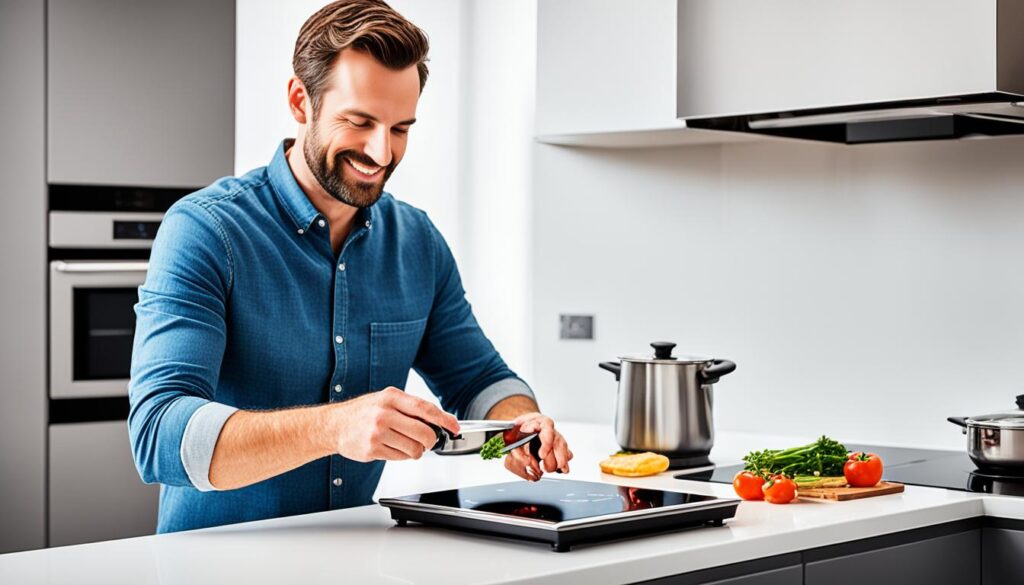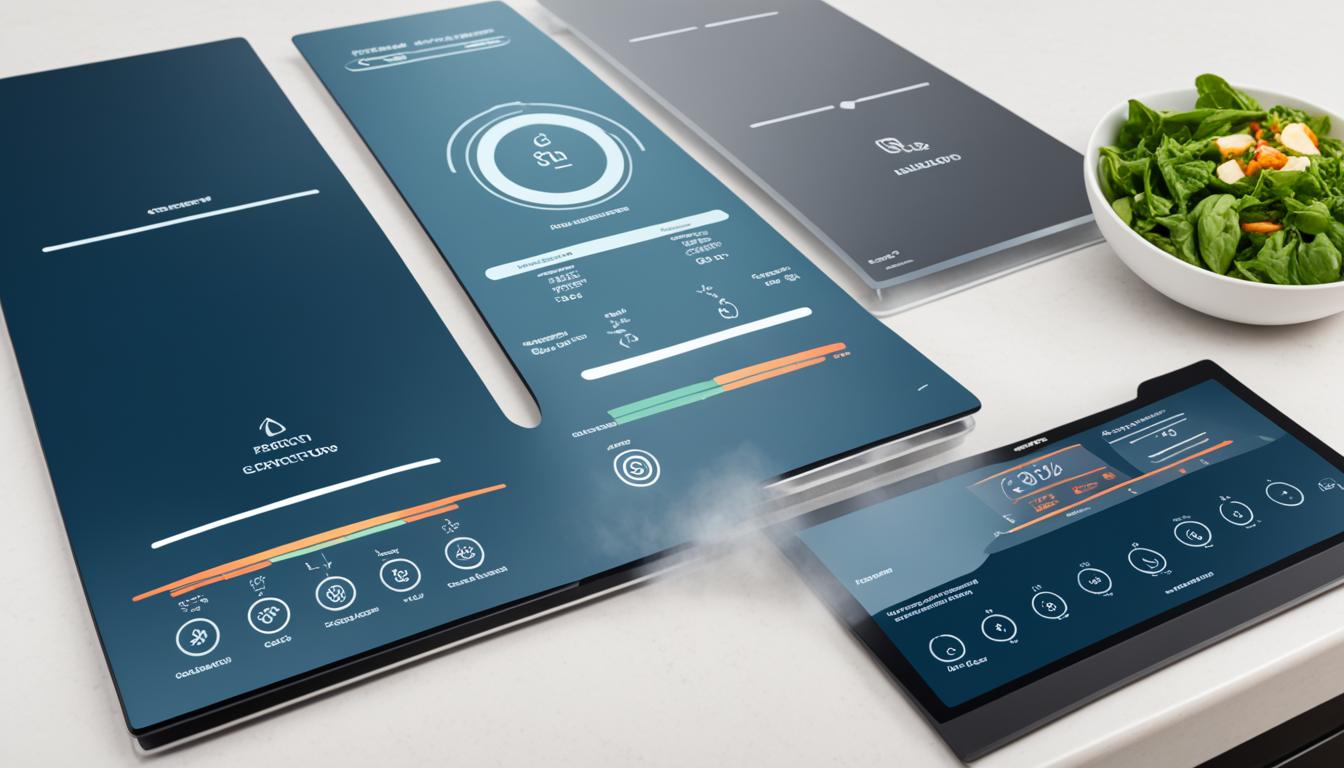When it comes to cooking, we often find ourselves standing at the crossroads, wondering which technology to choose. Gas or electric? Well, let’s throw another option into the mix: induction cooktops. But are they really worth the hype? Are they as efficient and safe as they claim to be?
Today, we’re going to dive deep into the world of induction cooktops and uncover the truth about their advantages and disadvantages. Prepare to be surprised!
Key Takeaways:
- Induction cooktops offer various benefits, including safety features, precise temperature control, and faster cooking times.
- These cooktops are energy-efficient and have a cool cooking surface, reducing the risk of accidents.
- On the downside, induction cooktops can be more expensive and require specific cookware.
- There is a learning curve involved, and overcooking is a potential challenge.
- Real users often praise the overall advantages and consider them a worthwhile investment.
Advantages of Induction Cooktops
When considering a new cooktop for your kitchen, it’s important to weigh the advantages and disadvantages of different options. Induction cooktops, in particular, offer several benefits that make them a popular choice among home cooks. Let’s explore the advantages of induction cooktops in detail:
- Built-in safety feature: Induction cooktops only heat up when compatible cookware is placed on the surface. This reduces the risk of burns and accidents, making it a safer choice for households with young children or clumsy chefs.
- Faster cooking: Induction technology delivers heat directly to the cookware, eliminating the need for preheating. This results in quicker boiling times and faster response to changes in heat settings. Say goodbye to waiting for water to boil or adjusting the heat in a hurry!
- Precise temperature control: Induction cooktops offer precise and instantaneous temperature adjustments. With the ability to fine-tune the heat levels, you have greater control over your cooking process. Whether you’re searing a steak or simmering a delicate sauce, you can easily achieve the desired results.
- Energy-efficient: Induction cooktops are more energy-efficient compared to traditional electric or gas ranges. Unlike gas burners that dissipate heat around the cookware, induction cooktops only heat the cookware itself. This minimizes heat loss, reduces cooking time, and ultimately lowers your energy consumption.
- Cool cooking surface: The glass surface of induction cooktops remains relatively cool during cooking. This not only prevents accidental burns but also makes cleanup easier. No more scrubbing stubborn stains off a heated surface!
Overall, induction cooktops provide a safe, efficient, and precise cooking experience. From faster cooking times to reduced energy consumption, their benefits are hard to ignore. However, it’s also important to consider the disadvantages before making a final decision. In the next section, we’ll explore the drawbacks of induction cooktops in detail.
Disadvantages of Induction Cooktops
While induction cooktops offer numerous advantages, there are some drawbacks to consider before making a purchase decision. It’s important to evaluate these disadvantages to ensure they align with your specific cooking needs.
Higher Cost
One of the main drawbacks of induction cooktops is their higher cost compared to traditional electric or gas ranges. The advanced technology involved in induction cooking contributes to the premium price tag. However, many users believe that the long-term benefits outweigh the initial investment.
Specific Cookware Requirements
Induction cooktops require the use of cookware with iron particles for effective heat transfer. This means that if you don’t already own induction-compatible pots and pans, you’ll need to purchase new ones. While this can be seen as an inconvenience, it also provides an opportunity to invest in high-quality cookware that is designed to maximize the benefits of induction technology.
Learning Curve
Using an induction cooktop can come with a learning curve, especially for those transitioning from traditional cooking methods. Proper placement of the cookware is necessary for activation, and some users may find it initially challenging to navigate the controls of their induction cooktop. However, with practice and familiarity, this learning curve can be overcome.
Overcooking Potential
Induction cooktops heat food faster than traditional cooking methods. While this can be beneficial in terms of time efficiency, it also requires adjustments in cooking techniques to avoid overcooking. Users may need to adapt their recipes and cooking times to accommodate the speed and precision of induction cooking.
Noise and Scratching
During operation, induction cooktops may produce a low humming sound. While this noise is generally minimal and may not be a significant issue for most users, it is worth considering if you have a preference for a completely silent cooking experience. Additionally, the glass surface of induction cooktops is prone to scratches if not handled with care, so it is important to use caution when placing or moving cookware on the surface.
Overall, the disadvantages of induction cooktops can be overcome with proper understanding and adjustments in cooking habits. While the initial cost may be higher and specific cookware is required, the benefits of precise temperature control, energy efficiency, and safety features often outweigh these drawbacks. By considering your cooking needs and preferences, you can make an informed decision on whether an induction cooktop is the right choice for you.
Real User Experiences and Recommendations
When it comes to induction cooktops, real users have shared their experiences and insights on the pros and cons of using this innovative cooking technology. Here are some key takeaways from their feedback:
Precise Heat Control and Quick Cooking Times
Many users praise induction cooktops for their ability to provide precise heat control, allowing for more accurate and consistent cooking. The quick cooking times are also a significant advantage, as induction technology heats up the cookware directly, resulting in faster boiling and cooking.
Noise and Scratching: Minor Inconveniences
While some users have reported a humming sound during operation and potential scratching on the glass surface, they consider these issues to be minor inconveniences compared to the overall benefits of induction cooktops. With proper care and maintenance, these concerns can be mitigated.
Long-Term Energy Savings and Cooking Benefits
Despite the higher initial investment compared to traditional cooktops, many users believe that the long-term energy savings and cooking benefits make induction cooktops worth it. The efficient transfer of heat directly to the cookware minimizes energy loss, resulting in lower utility bills over time.
Safety Features and Absence of Open Flames
Users with children appreciate the safety features of induction cooktops, such as the absence of open flames. This eliminates the risk of burns and accidents, providing peace of mind while cooking with little ones around.
Best Practices for Optimal Results
To get the most out of your induction cooktop, it is recommended to use induction-safe cookware with iron particles for effective heat transfer. Additionally, proper cookware placement is crucial for activation and optimal cooking results. By following these best practices, users can enjoy the full benefits of induction technology.

In conclusion, real user experiences highlight the advantages of precise heat control, quick cooking times, long-term energy savings, and safety features when using induction cooktops. Although there may be minor inconveniences like noise and scratching, the overall benefits outweigh the drawbacks. By following recommended practices, users can maximize the potential of their induction cooktops for efficient and safe cooking experiences.
Conclusion
In conclusion, induction cooktops offer numerous benefits that make them a popular choice for modern kitchens. One of their key advantages is the ability to cook food faster, thanks to the direct and instantaneous heat transfer to the cookware. This not only saves valuable cooking time but also ensures quick response to changes in heat settings, allowing for precise temperature control.
Another significant benefit of induction cooktops is their energy efficiency. By heating only the cookware and not the surrounding surface, these cooktops minimize heat loss and reduce energy consumption. This eco-friendly feature not only benefits the environment but also helps users save on their utility bills over time.
While there are a few disadvantages to consider, including the higher initial cost and the need for specific induction-compatible cookware, the overall advantages of induction cooktops outweigh these drawbacks. Their safety features, such as the cool cooking surface and built-in safety mechanisms, provide peace of mind, especially for households with young children. The induction technology also eliminates the risk of gas leaks or open flames, making it a safer option compared to traditional gas cooktops.
In summary, induction cooktops offer a modern and efficient way of cooking, with fast heat responses, precise temperature control, energy efficiency, and enhanced safety features. Despite a few minor drawbacks, induction cooktops are a valuable investment for those who prioritize efficiency, control, and safety in their cooking experience.
